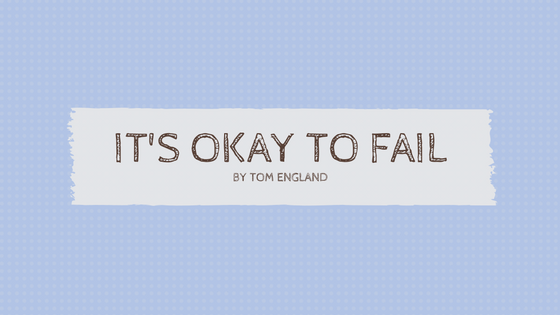Hi friends! This blog post features an article that Tom wrote for Frederick’s Child magazine this month. We hope you enjoy!
Thomas Edison, Alexander Graham Bell, George Washington Carver, and Albert Einstein all had one thing in common: they had more failures than successes. And that’s a fact that we should not be afraid to teach our children.
When we fail we learn. Most importantly, we learn what didn’t work—and that leads directly to new ideas and innovative approaches to problem solving.
The old adage that we are born with a certain level of intelligence and that is all we will ever attain is now under fire, and it’s about time. We have all heard it: “I was never very good at math. My son must have gotten my genes.” “She gets her artistic ability from her dad. I could never draw a straight line.” We shouldn’t be so quick to give up and blame genetics, because research has shown that cognitive ability can be increased through practice, hard work, and realizing it’s okay—in fact, it’s necessary—to fail.
Several months ago, I introduced a logic game with different skill levels to a group of middle-school-aged kids. A few of them immediately said, “Oh, I’ve never been very good at this kind of game.” I suggested starting at the beginner’s level and then left them to figure out the ins and outs of the game on their own. Almost an hour later, I checked in on them again and—much to my surprise—they were all still playing the game. They were trying certain configurations, sharing suggestions with each other, and having fun figuring out what worked and didn’t work. They might not have realized it at the time, but they were learning too—not just how to play the game, but also how to think “outside the box,” increase their cognitive abilities, and prove that they could play a game they almost gave up on originally.
It is rewarding—whether you’re the participant, the parent, or as I was, just the casual observer—to see individuals challenge themselves to achieve a desired goal, whether it’s mastering different skill levels of a game, learning new information, or exploring new fields of study. Being willing to accept failure as a means of moving forward is a mindset that leads to success.
However, there is another mindset where individuals are so terrified of failure that they will not challenge themselves. Perhaps they have heard over and over again that they won’t do well in science because everyone else in the family excels in the arts. Or maybe they have been praised so profusely for being a fast runner that they are afraid trying out for weightlifting, and failing, might be viewed by their parents as a disappointment. This negative mindset stifles the creative nature that is innate in all of us, and squelches our desire to take chances, challenge ourselves, and learn from our mistakes.
Children who are terrified of failure tend to “play it safe,” never challenging themselves, and, as a result, never growing and understanding their true potential. When we as adults view failure as a weakness, we often communicate that in indirect, and at times very direct, ways. If we change our mindset to embracing failure and the good that can result from struggles and challenges, then we will see children become increasingly willing to try something new and out of their comfort zone—whether it’s a logic game, a school assignment, a new sport, or an activity that peaks their curiosity. Removing the stigma that failure is bad encourages children to respond positively to setbacks—to see challenges as opportunities to ask questions, try and try again, and grow their skill set—and their brains.
As the oft-repeated adage goes, “If at first you don’t succeed, try, try again.” There is great wisdom in these words—wisdom that we should be intentional about sharing with children.






